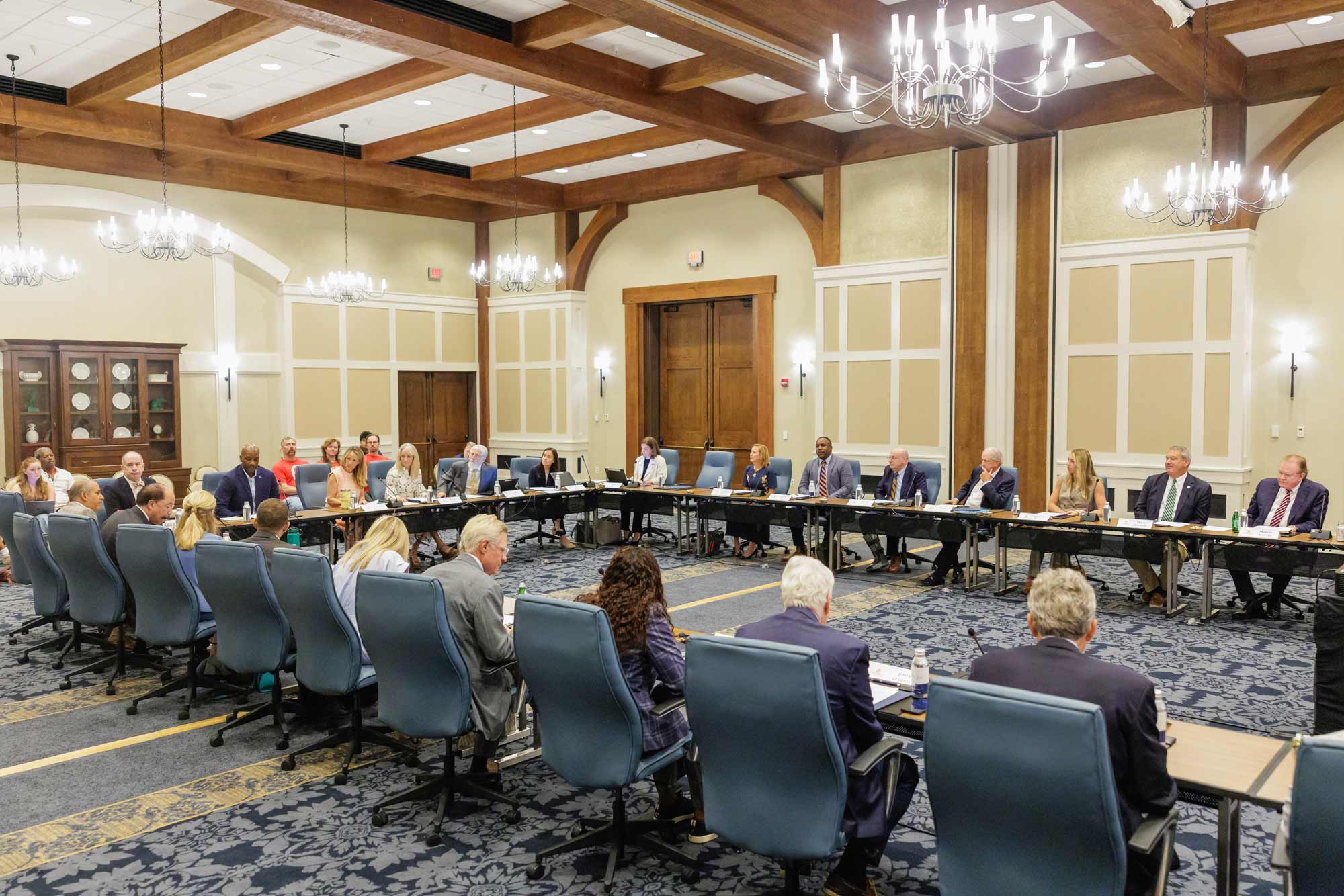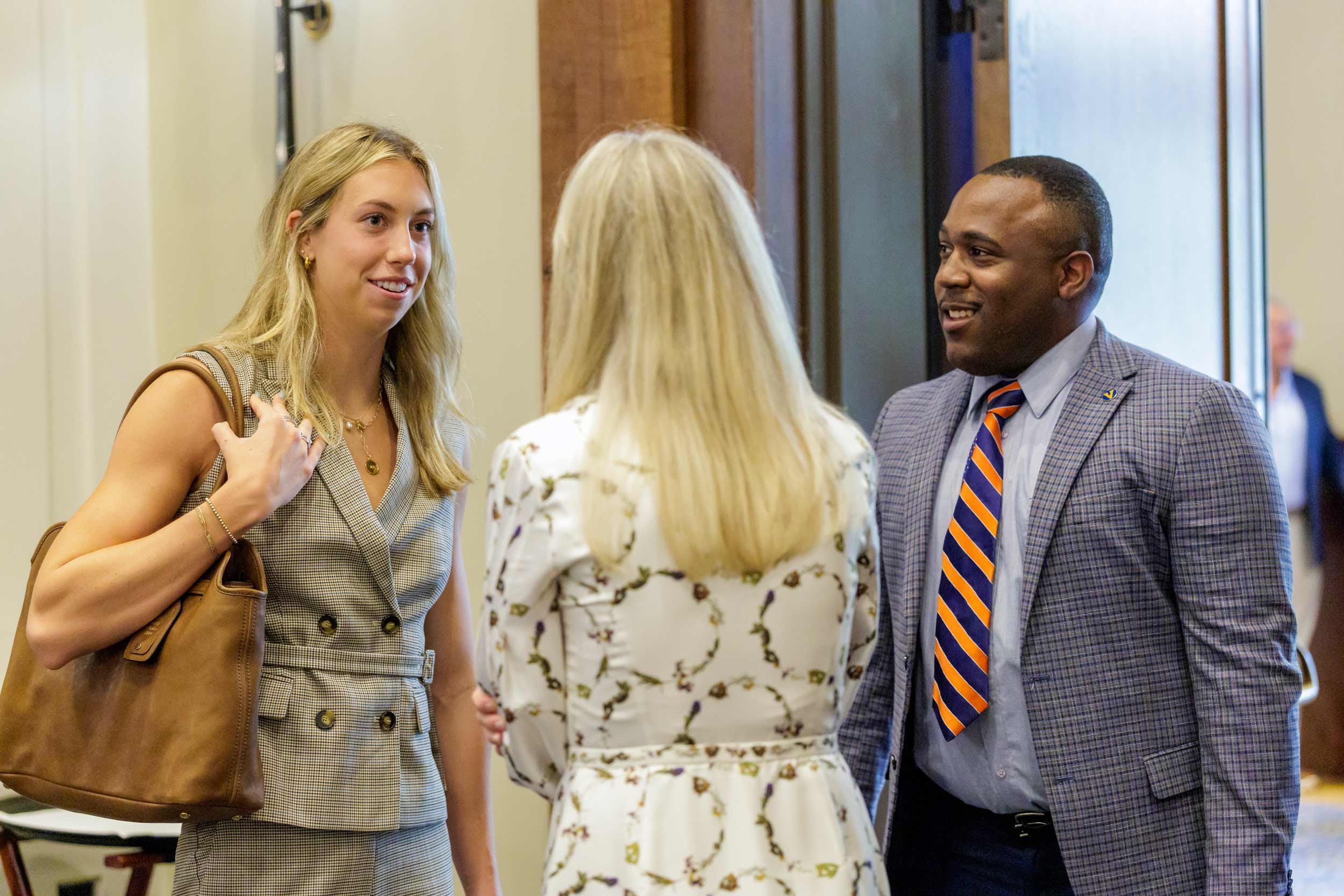The search for the University of Virginia’s 10th president launched Friday with a meeting of the Board of Visitors’ Special Committee on the Nomination of a President, and one thing became clear from the outset: The process will rely on extensive input from all corners of the UVA community.
The meeting was the committee’s first of several that will take place over the next few months. One of the key topics of discussion was creating opportunities for UVA community members to make their voices heard through in-person conversations and a website designed to solicit their input.
Board Rector Rachel Sheridan opened the meeting by charging the committee with delivering a small pool of qualified candidates from which the board will select the next president.
“Each of you brings not only expertise, but also a deep understanding of, and love for, UVA,” she said. “This is an exciting and meaningful opportunity to shape our next chapter of the University story. I’m honored to work alongside you, and I sincerely thank you in advance for your service and commitment to this process.”
The 28-person search committee appointed last month to find a successor to former UVA President Jim Ryan, who resigned in June, is more extensive and more representative than any of the previous presidential search committees. The committee includes more members, and more student members, than the effort that brought Ryan to Grounds in 2018.

The 28-person presidential search committee meets for the first time Friday. Sheridan charged them with delivering a small pool of qualified candidates to the board, which will select UVA’s 10th president. (Photo by Lathan Goumas, University Communications)
Vice Rector Porter Wilkinson emphasized it will be important for search committee members to understand their duty is to the full University, not solely to the groups they represent.
“You were selected for your deep ties to the University, and you represent a particular cohort,” Wilkinson said. “At the same time, we’re going to ask you to put those aside and channel the other voices at the institution. Please don’t think of your role in this committee as necessarily parochial. We want you to represent the University as a whole and do your best to listen to as many voices as you can, and be a vessel for those voices in this search and in your comments to the committee.”
A national executive recruitment firm, Isaacson, Miller, will assist the committee with recruiting and vetting candidates. That firm, which has a history of landing top-quality academic candidates at UVA and other colleges and universities, will be assisted by UVA’s in-house Executive Search Group.
John Isaacson, founder of Isaacson, Miller, said the board has done a superb job in assembling the committee members. He agreed with Wilkinson on the committee’s charge.
“This is a terrifically representative search committee, so that’s a very good thing,” Isaacson said. “The important thing is for all of the committee members to rise to a fiduciary duty for the whole University, rather than a representative role for a particular interest. We’ll emphasize that, and I’m sure the chairs will emphasize that, too.”

John Isaacson, chair of the national search firm assisting the committee in recruitment, tells the committee UVA will surely attract top-notch candidates. “It’s rare how well this University is positioned,” he said. Sheridan, to his right, is leading the search committee. (Photo by Lathan Goumas, University Communications)
Isaacson told the committee that, in his experience, UVA is well placed to attract top candidates.
“It’s rare how well this University is positioned,” he said. “It has stunning retention, graduation and application rates. Only the great private universities can rival that, and maybe one or two other publics could. … Your alumni loyalty is so impressive and it’s rare to find a mid-sized university, which this is, that can raise $6 billion. That’s the kind of thing really big or really wealthy private universities do, but publics of this size almost never do it, and it’s a great marker of the bedrock support this University has.”
Sheridan and Wilkinson – both graduates of the University – divided the 28-person search committee into five subcommittees tasked with gathering input from the University’s constituencies.
Those meetings, to be scheduled, will help the subcommittee members understand from their audiences and from the University community the qualities and competencies desired in UVA’s next president.
UVA students
Babur Lateef, a former board member and current graduate student, will lead a group meeting with UVA students. Search committee members Kenyon Bonner, vice president and chief student affairs officer; Gregory Perryman, the board’s student representative; Doug Wetmore, board member; and Carla Williams, director of athletics, will also serve on the student subcommittee.
Faculty, staff and administration
Former board rector George Martin will lead this subcommittee. He is joined by Philip Bourne, dean of the School of Data Science; Jim Donovan, board member; Jim Lambert, the board’s faculty representative; Sherri Moore, McIntire School of Commerce associate professor; and Adam Richard, co-chair of the UVA Staff Senate Executive Committee.
Research, science and medicine
The vice president for research, Lori McMahon, will lead the subcommittee engaging with UVA’s researchers, scientists and medical staff. Board members Paul Manning and Dr. David Okonkwo, along with interim Vice President for Health Affairs Dr. Mitch Rosner, will assist McMahon.
Donors, alumni and parents
Double Hoo Peter Grant, who chaired UVA’s Honor the Future capital campaign, will chair the subcommittee gathering input from donors, alumni and families. Joining him are Marvin Bush, vice president of the Virginia Athletics Foundation; board members Marvin Gilliam and John Nau; and Gretchen Walsh, a 2025 UVA graduate and Olympic medalist.
Communications and coordination
Pam Edmonds, trustee emerita of the College Foundation and a trustee of the UVA Health Foundation, will oversee this subcommittee. She’ll be aided by Quana Dennis, former teaching faculty member at St. Anne’s-Belfield and a UVA doctoral student; John Harris and Amanda Pillion, board members; David Leblang, professor of politics and public policy; and Jimmy Reyes, a former board member. This subcommittee’s role is to ensure information flows freely among the groups.
Walsh, one of the nation’s most decorated swimmers who earned two gold and two silver medals at the Paris Olympics, introduced herself to fellow committee members as the youngest alumna in the group. She graduated in May from the McIntire School of Commerce and told UVA Today she is eager to serve the University on the presidential selection committee.
“As the work of the special committee gets underway, I am looking forward to sharing my perspective as a recently graduated student and an athlete with my fellow committee members and the board,” she said. “I am also eager to hear from other students and community members about what matters most to them as the University seeks its next president. This process will help shape the future of the University we love, and I am honored to be involved.”
Board members said they anticipate the diverse University community will want a candidate who is a visionary; could represent all 12 of the schools and UVA Health; who would energize students, faculty and staff; is an astute businessperson; and the kind of president who will attract other top candidates to fill a number of open leadership positions at the University. One committee member said he would anticipate candidates with ties to UVA to have a “leg up” on unaffiliated contenders, but that isn’t a requirement.
After the meeting, the committee sent an email to the University community outlining how it will need to balance transparency in the process with confidentiality for candidates under consideration.
“At the same time, we are balancing engagement with confidentiality – because doing so ensures the strongest and most successful search,” the committee said in a statement. “Some have equated necessary confidentiality with secrecy or exclusion, but that misunderstands how presidential searches work.
“This process is not about partisanship, ideology, or personal agendas,” the statement continued. “It is about finding the right leader for the University of Virginia. Our goal is clear: to identify a president who embodies the University’s mission and values, who can lead with courage and vision, and who will continue to strengthen UVA as a place of academic excellence, public service, and belonging for all.”



